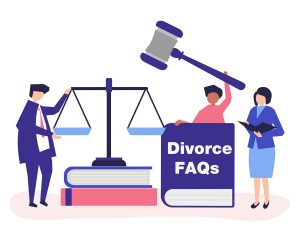1. HOW LONG DOES IT TAKE TO GET A DIVORCE IN MASSACHUSETTS?
It depends on the circumstances. The best case is if divorce is uncontested, meaning the parties are in agreement on all issues. The parties can file the required paperwork at the Probate Court and in some counties can be heard by a Judge that same day. The divorce will become final 120 days after the hearing. On the other end of the spectrum, a highly contentious divorce can take years.
2. DO I NEED TO HIRE AN ATTORNEY?
An attorney is not required in Massachusetts, however, it can be helpful. At a minimum, before deciding to take on your divorce on your own (pro se) you can attend consultations with various attorneys to get a sense of what will be required.
3. CAN MY SPOUSE AND I USE THE SAME ATTORNEY?
No. If you chose to negotiate through mediation you would use the same mediator. Otherwise, it would be a conflict of interest for an attorney to represent both sides. However, to save money, and if there is communication between the parties, divorces often proceed with one party hiring an attorney while the other party proceeds without an attorney (pro se).
4. WHAT IS AN UNCONTESTED DIVORCE?
An uncontested divorce is where the parties agree on all issues. They have no disputes about child support, child custody, alimony or division of assets. They would then jointly file a 1(A) petition for divorce as co-petitioners.
5. CAN I CONTEST THE DIVORCE?
Massachusetts allows divorce on the grounds of irretrievable breakdown of the marriage. This allows the court to grant a divorce if only one party believes the marriage is broken. A disagreeing spouse cannot stop the process.
6. WHAT ARE TEMPORARY ORDERS?
Because the process of a divorce may take some time to settle, the courts have a provision to make orders before the divorce is finalized. These are called Temporary Orders. A party motions the court to provide Temporary Orders. Temporary Orders can be made for decisions like alimony, custody and child support.
7. WHO GETS TO STAY IN THE FAMILY HOME?
Often, as the parties do not get along, both staying in the home is not an option. If the parties cannot agree as to who should stay, they can let the judge decide.
8. WHAT IS A FINANCIAL STATEMENT?
The Financial Statement is a Massachusetts Probate Court form that details the finances of the parties to a divorce. There are two separate forms of the Financial Statement document. If a party has an income of $75,000.00 or more they must file what is known as the “long-form”, a more detailed statement. If the party’s gross earnings are less than $75,000.00 they need to file the “short-form”.
9. HOW MUCH WILL A DIVORCE COST?
The cost of a divorce varies greatly as do the circumstances of every marriage. The least expensive are where the issues are simple and the parties are in agreement. In a contested case, if the parties settle upon an agreement the costs can stay reasonable. The worst case is where the case goes to trial and costs rise very quickly.
Things that add up the bill are discovery. There is a mandatory discovery required in Massachusetts while filing for a divorce that leads to an automatic exchange of information. This is Supplemental Probate and Family Court Rule 401 which requires each party to file a Financial Statement. In certain cases, for example, when there is a claim for child support, Supplemental Probate and Family Court Rule 410 operates. Rule 410 requires each party to furnish additional financial information.
If you have more questions, please contact divorce attorney Frank Grimaldi.

